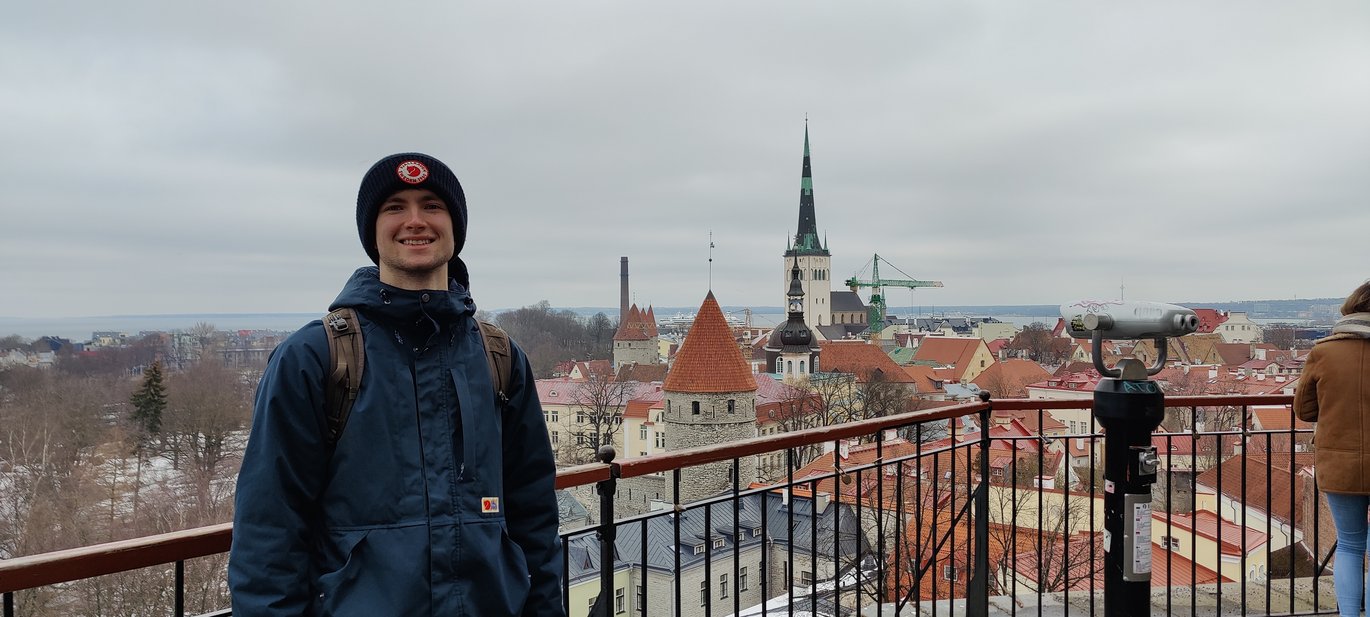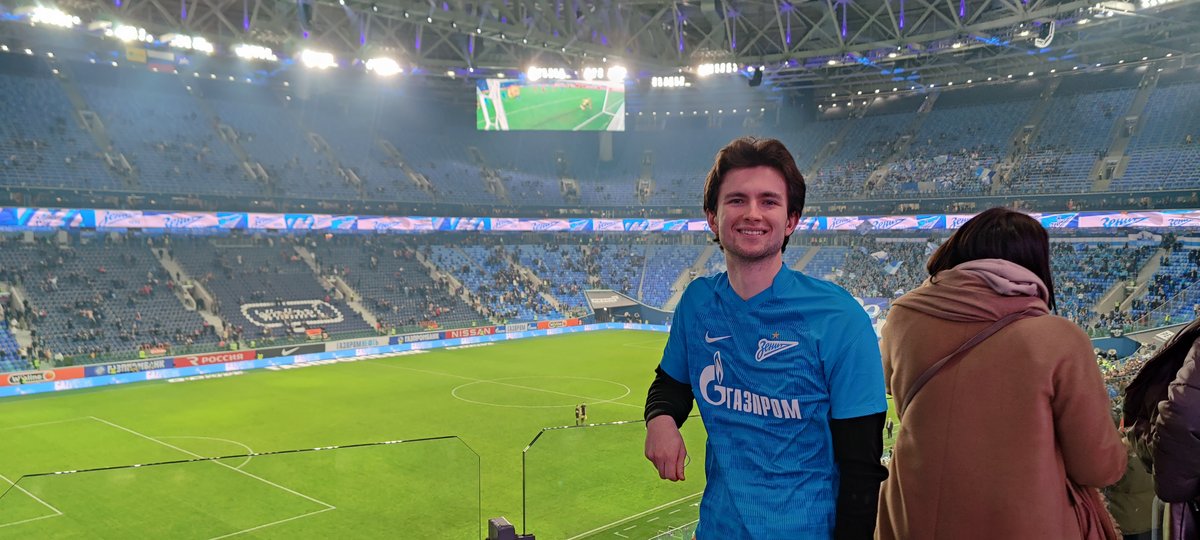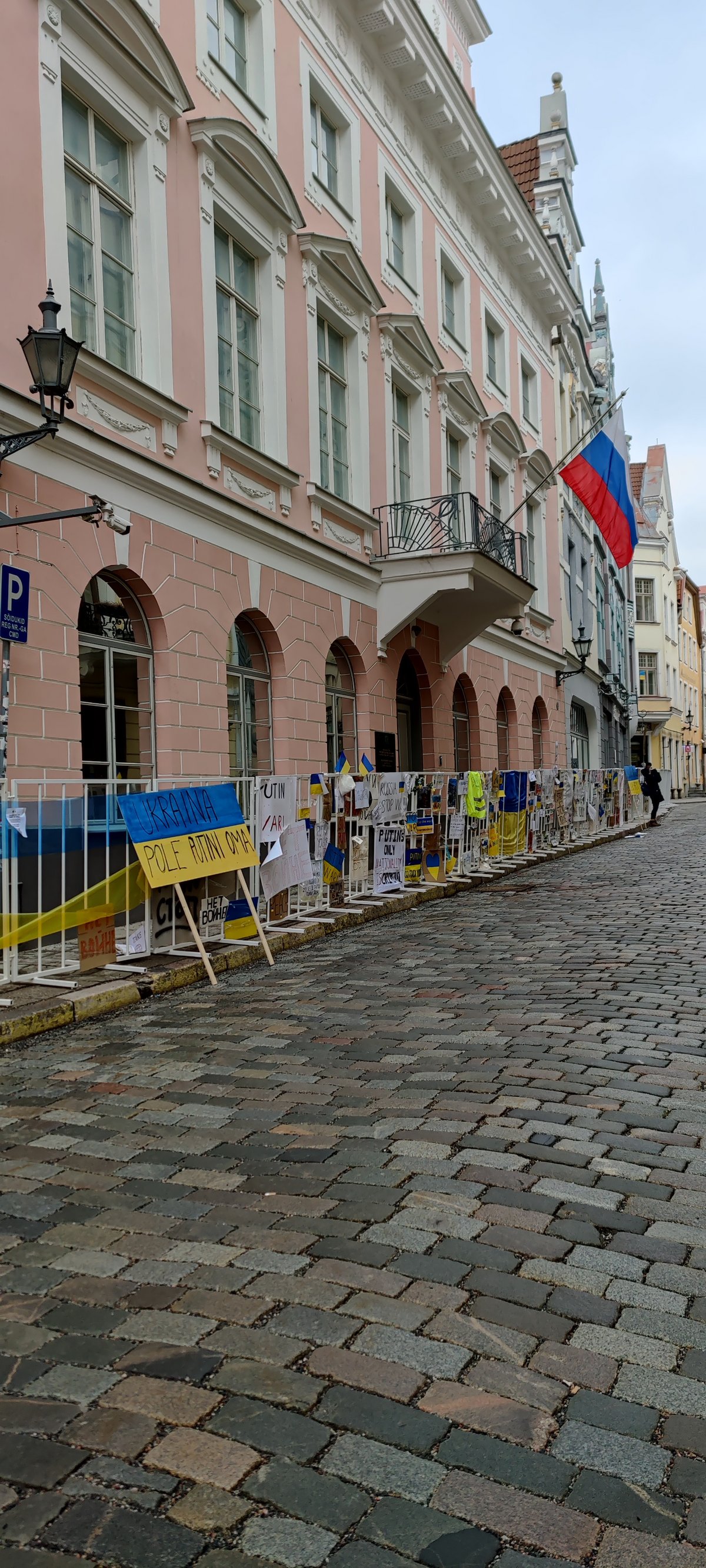Exchange student Laurids left Saint Petersburg on a FlixBus when Putin invaded Ukraine
Laurids Kawauchi, fourth-semester student on Russian Studies, managed one month in Saint Petersburg before his exchange programme was abruptly brought to an end by Russia’s invasion of Ukraine. When Denmark sent weapons to Ukraine and the West threatened Russia with SWIFT sanctions, he knew it was time to get out.

Few expected that Russia would invade Ukraine, and fourth-semester student Laurids Kawauchi also had no idea what would happen on 24 February when he embarked on his study abroad programme in Saint Petersburg.
Laurids Kawauchi is reading Russian Studies at AU, and, on 1 February, he left for Saint Petersburg to stay with a host family and study in the city. Only one month later – on 1 March – he left Russian soil again, and, today, sitting in the Nobel Park library, he reflects on his final few days in Russia.
Even when President Vladimir Putin sent his troops into Ukraine, being in Saint Petersburg was like being in a parallel universe, where life just carried on as usual for Russians, he explains.
“There were demonstrations on the main street in Saint Petersburg, and the first evening we knew they would demonstrate, we walked passed the metro and saw people being arrested for holding up signs saying ‘No to war’. Here you could already feel that something had started to happen.”
“But, apart from that, everything was normal. People just got on with their everyday lives, and that also felt a little surreal,” says 23-year-old Laurids Kawauchi.
Russia hit by harsh sanctions
But when the reports of massive sanctions against Russia reached Laurids Kawauchi, and when he read in the media that Denmark was sending weapons to Ukraine, he knew it was time to leave the country.
“It was a game changer for me when I saw that Demark had begun to send weapons to Ukraine. I started to worry about what would happen to us Danish citizens in Russia now that we had got involved in the conflict. I was a bit nervous that Russia would close the border for Danish citizens, even though I knew this would take a lot. But I think that’s what made me want to go home.”
“At first I thought it would be fine. There were no real signs of conflict over there. But then sanctions gradually began to be imposed on Russia, and then I could feel that things were happening. I was particularly worried about the SWIFT sanction, because I feared I wouldn’t be able to pay my rent, which went via Airbnb from my Danish account. In that case, in principle, I would have been homeless from 20 March,” says Laurids Kawauchi.
AU advised students to leave Russia
AU contacted the exchange students in Saint Petersburg on 28 February and referred to the advice of the Danish Ministry of Foreign Affairs, which, at that time, was that Danish tourists should not travel to Russia.
“We thought we would get information from the Ministry immediately, but it was actually a few long days before they made any announcements. At first they only advised tourists not to travel to the country, but, of course, we weren’t exactly tourists. But then AU wrote to us and advised us to come home, and our teacher also wrote to us,” says Laurids Kawauchi.
According to Laurids Kawauchi, there were nine students from Russian Studies in Russia at the time. Their teacher advised them to come home on 27 February, as she could see that flights out of the country were getting fewer.
“We felt a bit powerless. We didn’t know what to do and when it would be too late to fly home. We had to judge it for ourselves, but I began to notice among my fellow exchange students that it was time to leave,” he says.
Time to come home – but no flights
Flights out of Russia began to disappear, and, once Laurids made the decision to come home, there was only one flight left, with Turkish Airlines. But when he tried to book, all the tickets had gone. Along with four others from his degree programme, he found a train to the capital of Finland, Helsinki, but this idea was rejected by the Ministry of Foreign Affairs, because the train was only for Finnish and Russian citizens.
“Then we found out that there were buses to Estonia, which we ended up taking. Some took a plane to Billund from there, but I needed to get to my parents’ house in Zealand, so I took a ferry to Sweden and a train to Copenhagen,” he explains about his trip, which included several stops along the way.
The FlixBus, which, according to Laurids Kawauchi, was full of Europeans, drove from Saint Petersburg to Tallinn in Estonia and was stopped three times along the way at Russian checkpoints guarded by soldiers with Kalashnikovs.
“It’s a bit strange to be forced to leave a country. The bus should have taken six hours to get to Tallinn, but it ended up taking nine hours because of all the checkpoints and bureaucracy.”
“We had our passports checked several times, but, in the end, we had to take all our luggage off the bus so it could be searched thoroughly and scanned. And then we could leave Russia. It took a long time. Everyone was tired and just wanted to get out of there,” he says.
He explains that three students originally chose to stay, but, when the situation intensified, they also left the country. These three students, Laurids Kawauchi remarks, are now in Estonia waiting to travel to Denmark.
“There were some from our degree programme who hoped that it would be okay and that there wouldn’t be further sanctions. They wanted to see how the situation would develop over there. I don’t think they were as worried as the rest of us,” he says.
Talking to Russians about the invasion
When Russia launched its invasion, Laurids was able to see how the Russian population were subjected to a type of censorship, which forced them to choose their words carefully.
“When we talked to the people at the university, we could see they were concerned about it. They had friends who had been taken away by the police and detained for 15 days, and now it is of course illegal to use words such as “war” in connection with the conflict,” he says.
“You could tell that people either didn’t want to talk about it because they were afraid of saying something wrong or they were against the war. Very few of the people we spoke to could understand what the government was doing,” says Laurids Kawauchi.
It is only since being back in Denmark that he has felt safe talking about his trip.
“I think it’s only since being home that I have dared to put things on social media or talk more freely, because, over there, you know there are just some things you cannot say in public. You may come across someone who misunderstands what you’re saying or feels provoked if you say something that can be perceived as negative,” he says.
An important part of student life lost
Like all other universities in Denmark, AU has decided to suspend all collaboration with Russian and Belarusian universities. This also means that students on the Russian Studies degree cannot look forward to an exchange programme in Russia anytime soon.
Laurids Kawauchi fears this will have a big impact on his studies. He had just begun to feel comfortable speaking Russian, and then he had to leave.
AU is now in the process of putting together a timetable for those students who have had to return home from Russia.
“It will probably be a slightly more relaxed – or at least a less packed – semester,” says Laurids Kawauchi.



